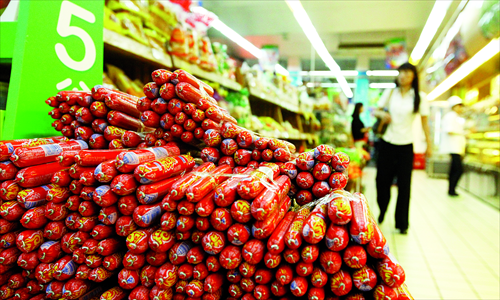Family in ‘maggot sausage’ shock

Customers yesterday seemed undeterred by China's latest food safety scandal, after maggots were allegedly found in sausages purchased in a Beijing supermarket.
Zhang Zizhen, a resident living in Daxing district, bought two bags of sausages made by Shuanghui Group, one of China's leading meat processors, in Wu-mart Daxing branch Sunday afternoon, but was shocked to see several dead maggots inside.
"My daughters, who ate the sausages, both suffered from vomiting and diarrhea afterwards. The older one is two months pregnant, and the hospital said she could have miscarried. She's still recovering at home," Zhang told the Global Times yesterday.
Although the other sausages seemed fine when he opened the packaging, after one or two days, maggots appeared in the packet.
He took the sausages to the supermarket in the evening, requesting an explanation from both Wu-mart and the producer. Shuanghui promised Zhang that they would deal with the issue the next day.
Daxing commercial and industrial authorities and Shuanghui started an investigation on Monday.
The Wu-mart branch would not comment on the source of the maggots yesterday, but a representative from the food section, surnamed Wang, said they had removed all of the sausage packets from the shelves.
Responding to Zhang's complaint, Shuanghui issued a statement on its website yesterday, which said it will disclose the results of the investigation when it is complete.
"We'll issue a detailed report after finishing the investigation, so please give us some time to conduct it," said a Shuanghui public relations officer, surnamed Yang, yesterday.
He insisted that those sausages were fit for consumption after being produced, and thought the problem was probably because the package was broken during transportation, or while in the store.
In the statement, Shuanghui said they would compensate Zhang and his family prior to the results, but Zhang refused, and asked that Shuanghui admit that the sausages contained maggots.
"What I want is only a sincere apology from them, not compensation," Zhang said.
Daxing branch of Beijing Administration of Industry and Commerce could not be reached for comment yesterday, but both Zhang and Shuanghui claimed the bureau had taken the sausage for further tests.
This is just the latest in Shuanghui's string of recent scandals. Last year, the group was revealed to have used pig feed containing clenbuterol, a chemical to prevent pigs from accumulating fat, which is banned as an additive in pig feed in China. The company later apologized.
Last month, industrial and commercial authorities in Guangzhou, Guangdong Province, reported that another type of Shuanghui-produced sausage contained excessive bacteria, which can cause diarrhea.
Some supermarket customers were undaunted by Shuanghui's sausage scandal yesterday.
A male customer at a Walmart store in Dawang Lu, Chaoyang district, was buying sausage made by the company last night, and said he was not worried.
"I think it's just a single case," he said, adding that if it was on the shelves, it must be OK.
A saleswoman in the store, standing near the processed meat counter, said the sausage always sold well. She had heard of the previous food scandals, but said no customers had ever complained to her.
Amid rising concern over food safety in China, as more and more scandals have been exposed, authorities laid out a series of measures to improve food safety.
So far, the measures announced, which include tightening supervision of producers and harsher punishments for those found to have violated the rules, seem not to have been very effective.
"What a pity that Chinese consumers have gradually lost confidence in food due to these recent scandals. So both the government and manufacturers must realize that they have a lot to do for food safety now," said Zhang Bailin, a professor from the food science department of Beijing Forestry University.
Both the companies involved in scandals and the government need to investigate these problems, or there will not be any progress in improving food safety in China, he noted.
"But in this particular case, it's not the right time to blame any party since the investigation hasn't yet concluded," Zhang said.